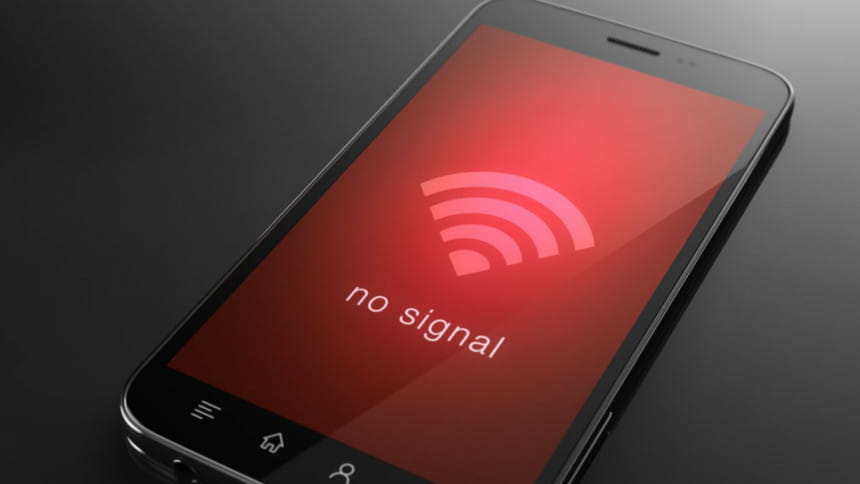When the network is as slow as the traffic

Going from a meeting in Gulshan to another in Motijheel one day earlier this month, I spent nearly two hours on the road which is quite common these days in Dhaka's traffic. Most of us try to utilise such horrendous commute hours by trying to make up on unfinished reading lists but in the din and bustle of Dhaka's traffic that's a real challenge.
Another way is to catch a few z's, but as anyone knows taking a nap is much easier in moving traffic and not in the halting kind we have here. That leaves pretty much the only other thing we can do while we are cooped up in jaunts from one end of the city to another—dial up all missed calls or simply catch up with friends, relatives and clients. And with more than 150 million phones in circulation flaunting the fastest and the latest 4G networks across the nation that should be a snap whether one uses the conventional cellular phone lines or IP telephony apps like WhatsApp or Viber.
Well, that's the theory—reality is much starker as usual. During the roughly one hour of talk time on this particular trip my calls dropped more than a dozen times, sometimes as frequently as within a minute. Such "dropped calls" has become so routine that an irritated Telecoms Ministry boss once called out the global CEO of a major local mobile phone operator at an international conference challenging him to fix this nuisance.
However, dropped calls are merely the tip of the proverbial iceberg when it comes to quality of service (QoS) which is usually benchmarked against Service Level Agreements (SLAs) on a number of performance metrics such as network availability, call success rate, incidence of call drops, etc. In the absence of any published SLAs for the network operators it is very difficult to hold their feet to the fire so to speak. The situation has become so unbearable that epithets such as "4G is for Gorur Gari Gathae Gorai" do not seem very unkind.
These days it is quite common to see the message "call failed" when calling a valid number and after several attempts the call goes through only to be interrupted by dropping the call midway. This has become such an irritant that people are forced to send text messages (SMS) and in that case also you are never sure if the message goes through in real time.
Telephony is supposed to provide communication contacts instantly without any perceptible delay while the Internet is supposedly a store-and-forward mechanism that may appear real-time in many applications today due to the extraordinary speed of data transmissions these days, a.k.a. 4G. While we boast of the latest and fastest, the existential reality of common citizens is anything but fast and instantaneous. In fact in many ways I wish our phones worked like they did 30 years ago when you picked up a phone and there was a dial tone and any number you called either rang or gave the busy signal—there was no uncertainty in the outcome.
Now with all these super high-tech telecom infrastructures we can't even be sure if we can connect to another number in a predictable way. The same goes for mobile internet. The operators claim its 4G but the network status continuously switches back and forth between E for Edge (2G), 3G and 4G making internet service highly spotty and unreliable on the road.
As the burgeoning urban dwellers of the country spend more and more time on the road—whether they like it or not—the ethereal connections to the real world through our mobile phones could be a life-saver only if the mobile networks quality of service was up to standard. The telecom regulator BTRC should be given a wide berth when dealing with such inconsistent quality of mobile services.
I recall the Consumers Association of Bangladesh (CAB) several years ago took up this issue with BTRC on behalf of millions of suffering subscribers but nothing much has come of it. We can only hope that the same telecom ministry boss will bear down on the incorrigible operators to take necessary measures to improve our mobile experience befitting our elevated status as a fast-growing middle-income country or they should be made to pay stiff penalties—either way a day of reckoning for the intransigent mobile operators is long overdue.
Habibullah N Karim is an author, policy activist, investor and serial entrepreneur. He is a founder and former president of BASIS and founder/CEO of Technohaven Company Ltd. Email: [email protected]





Comments